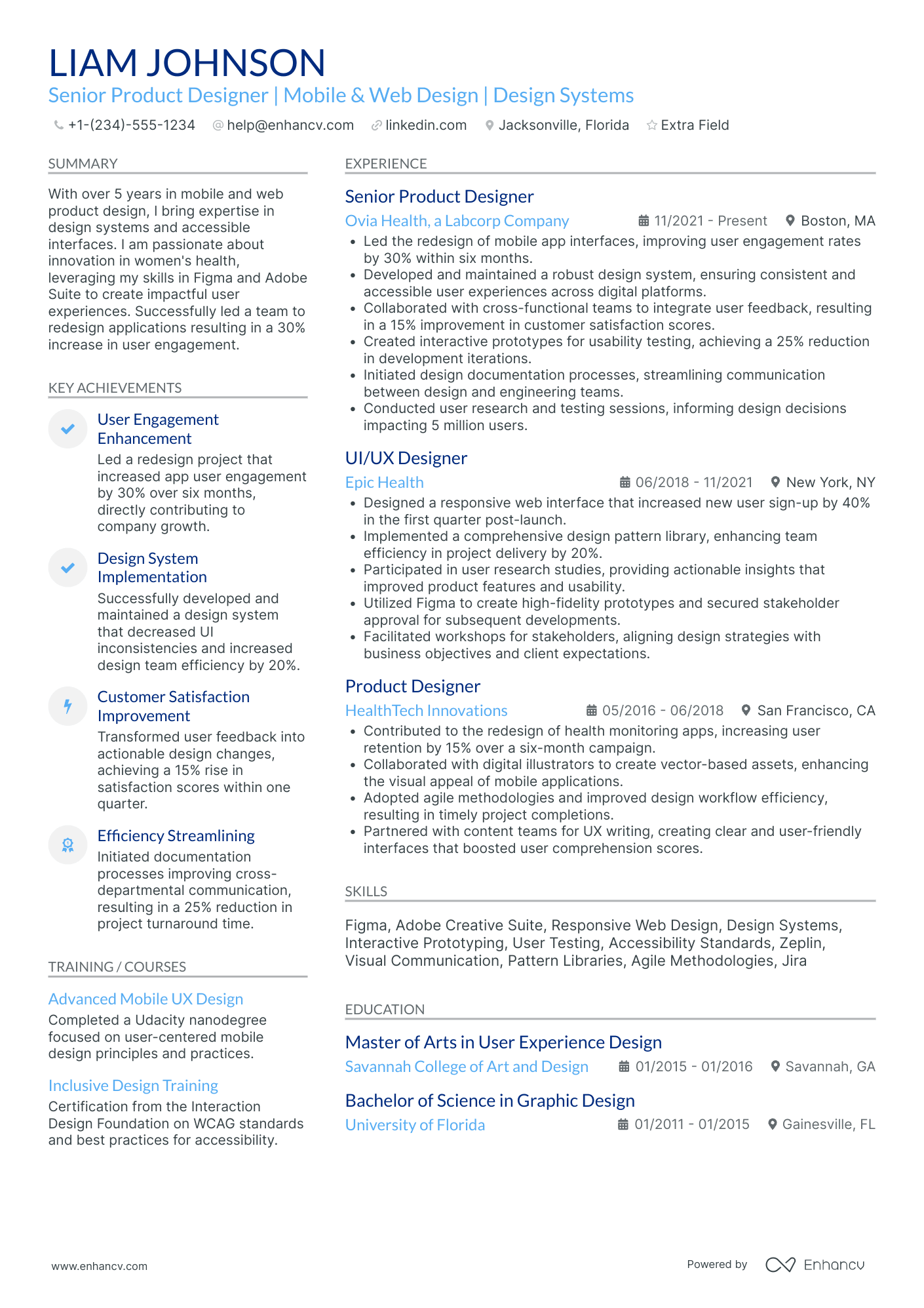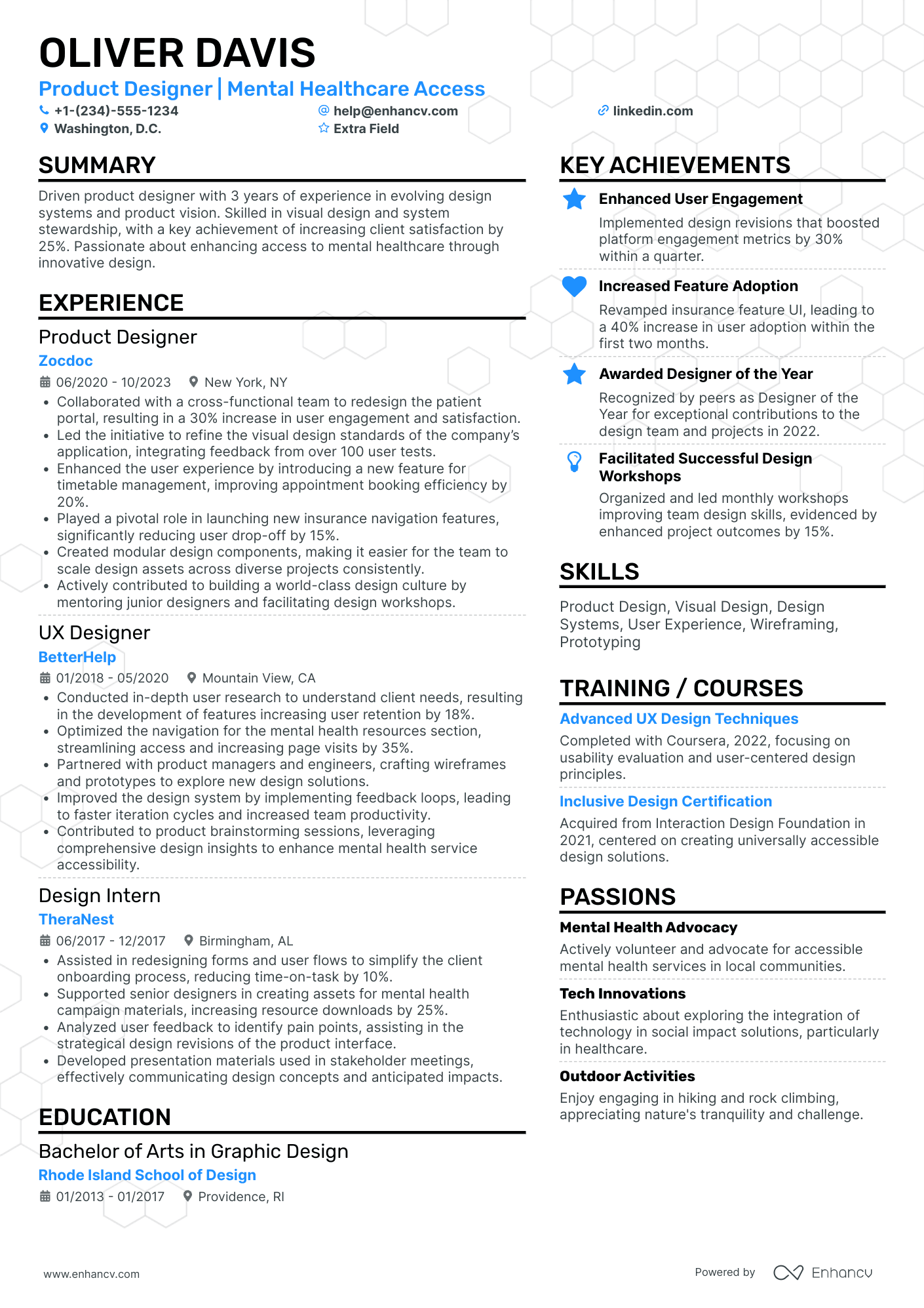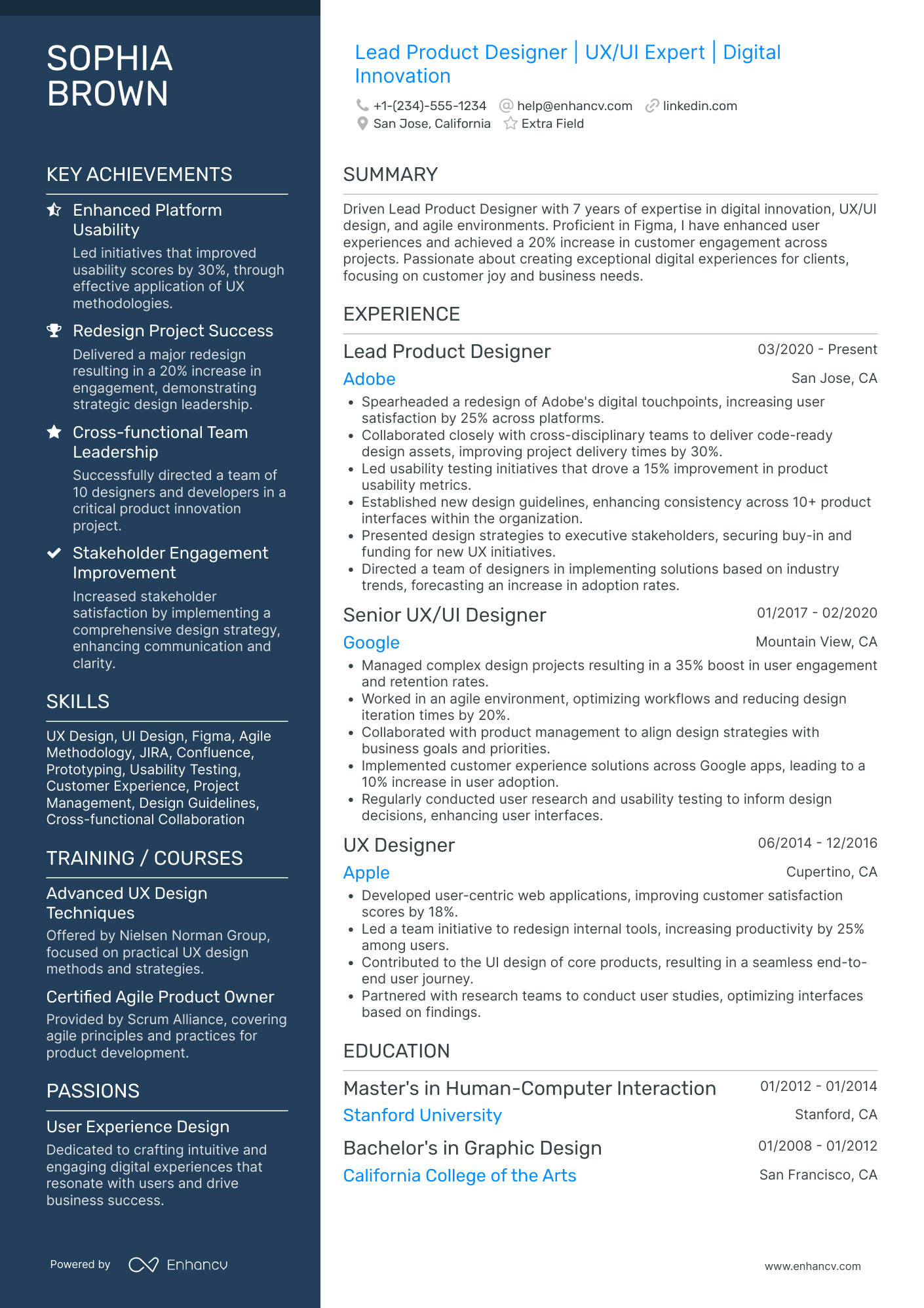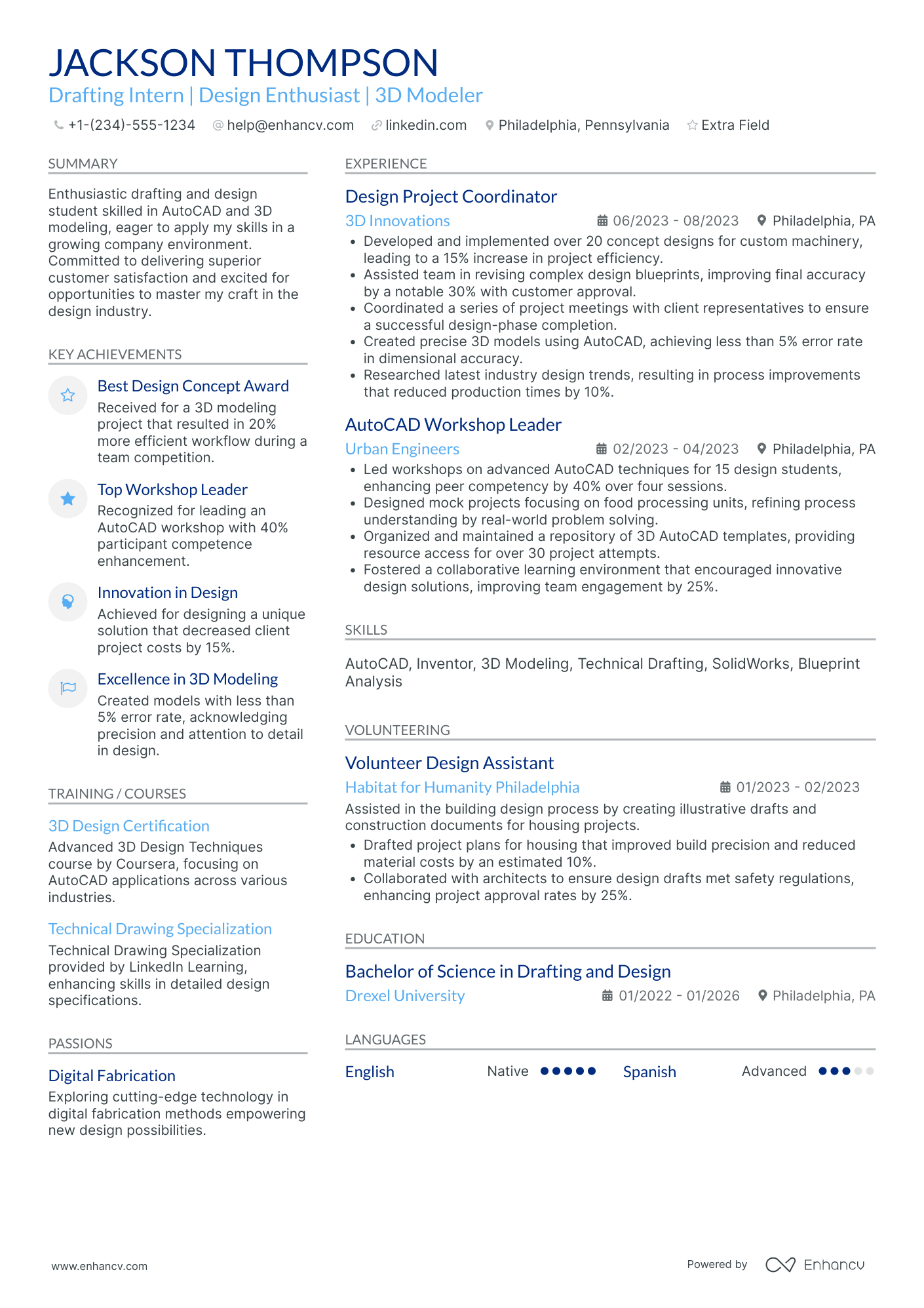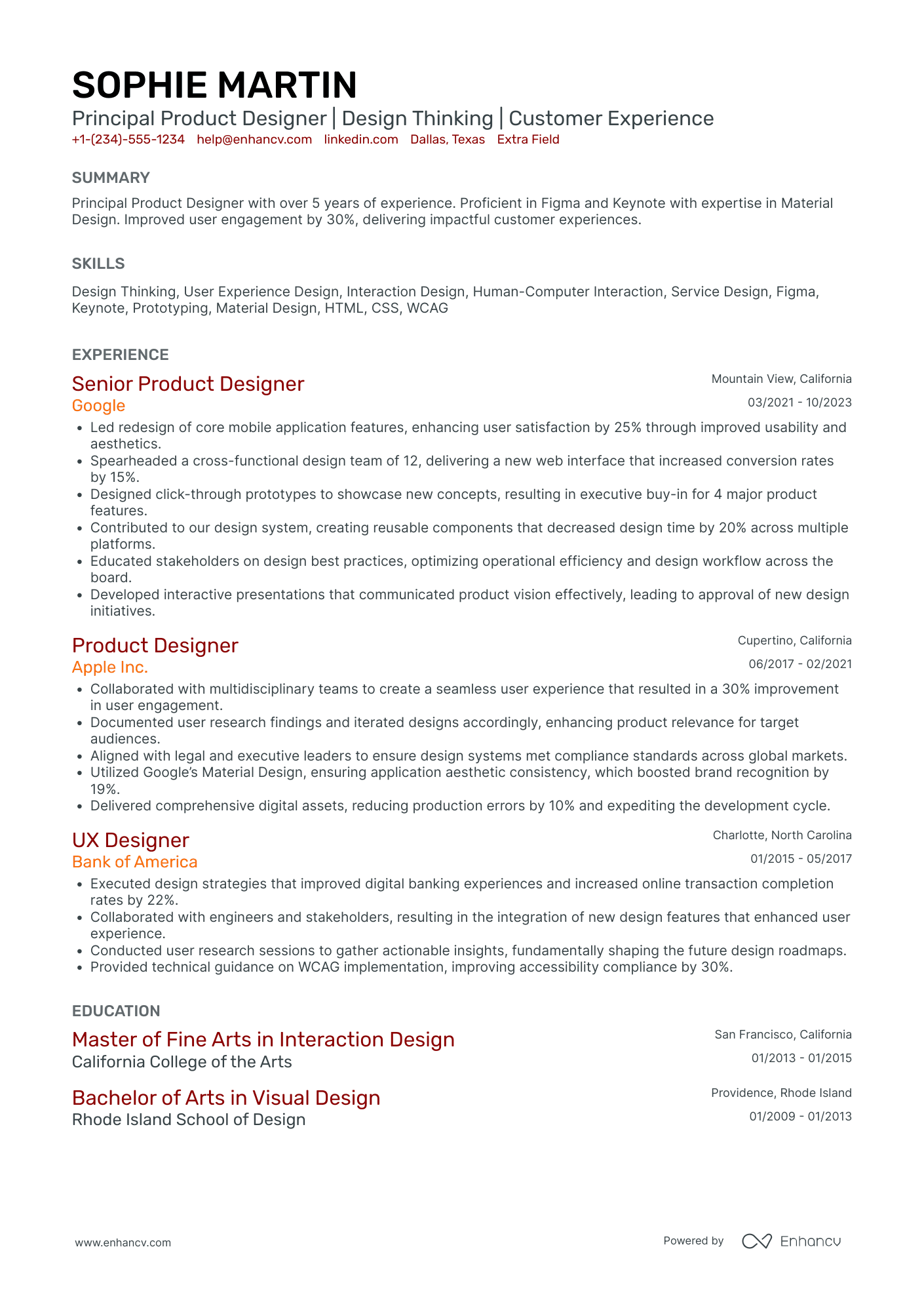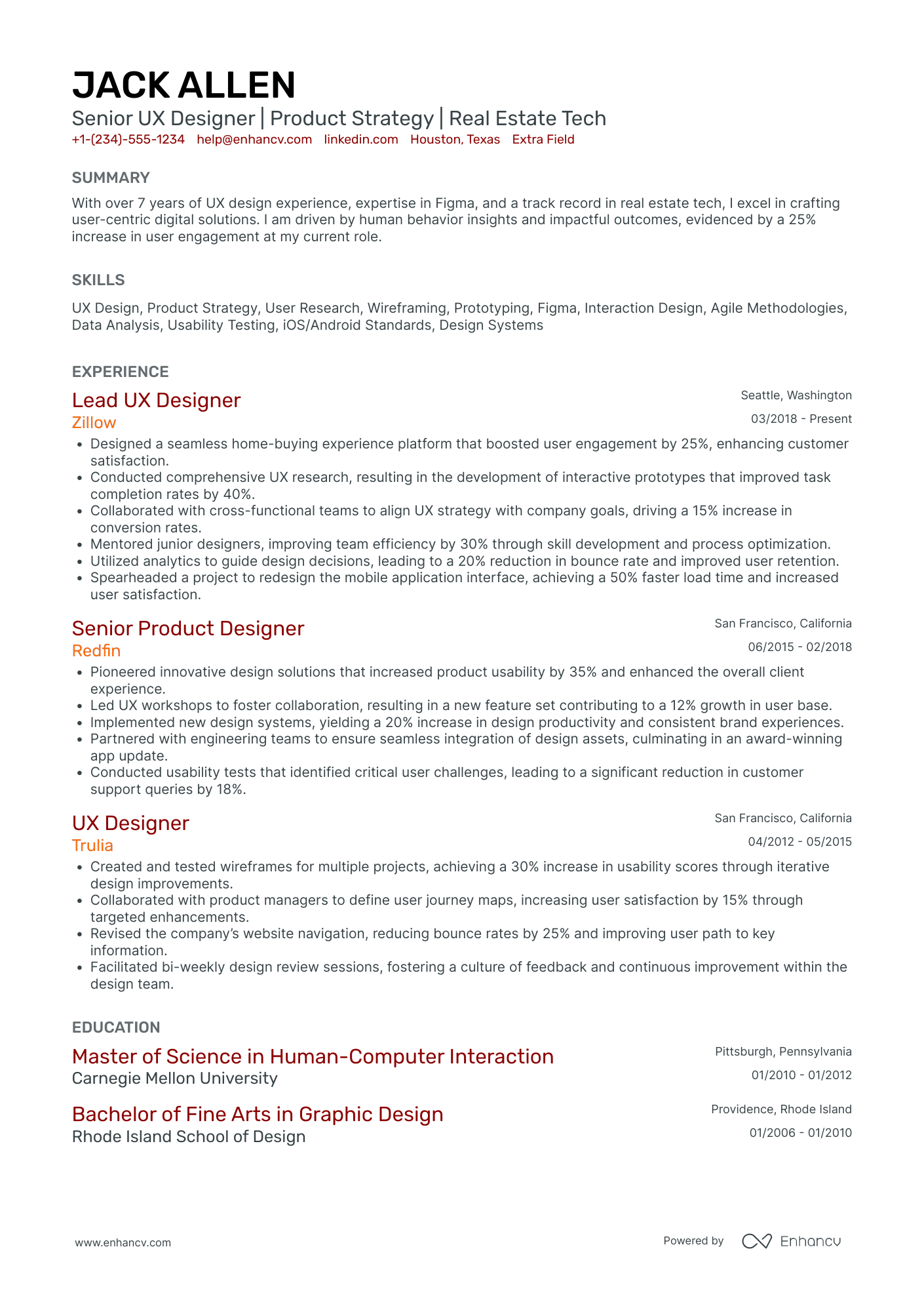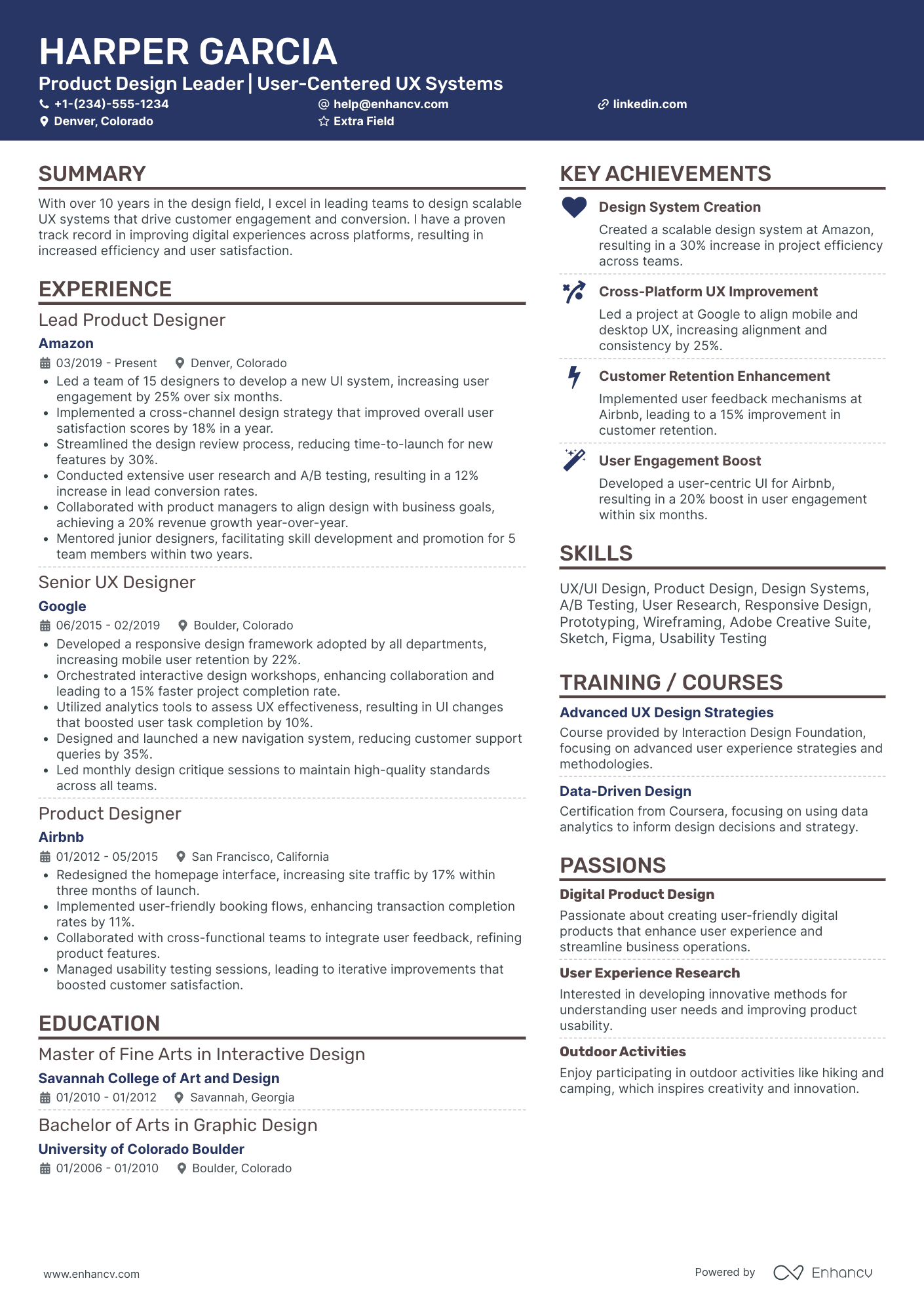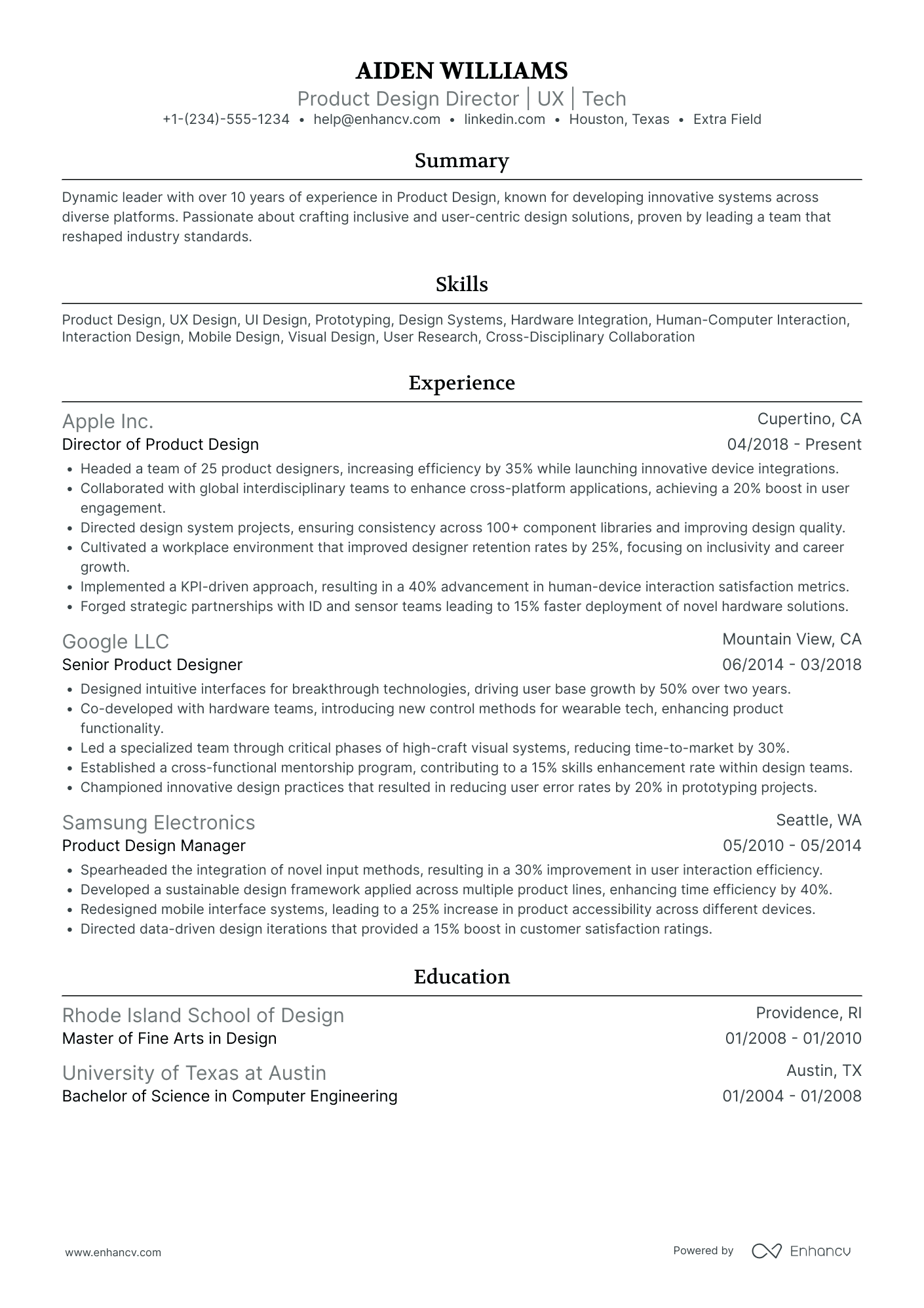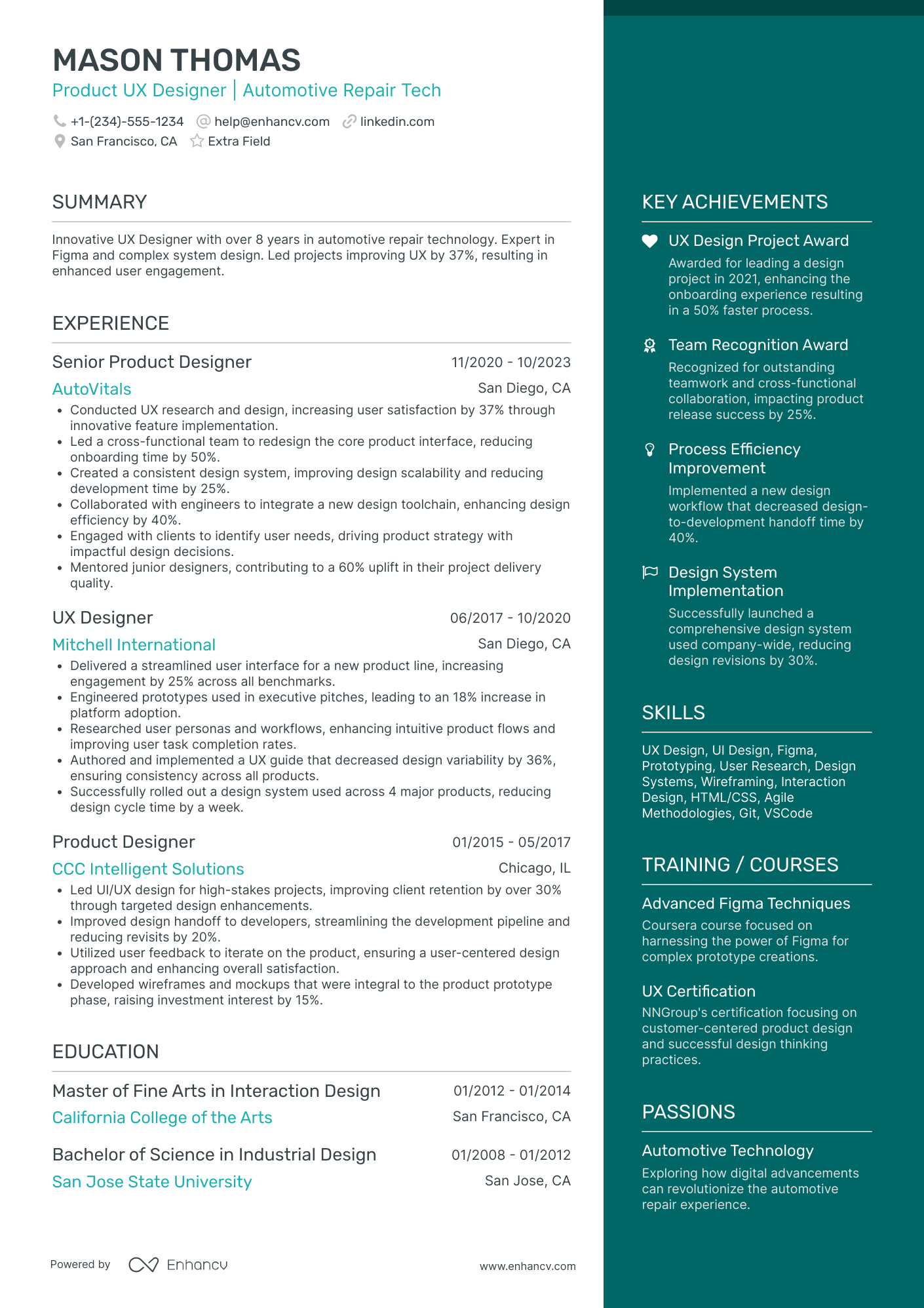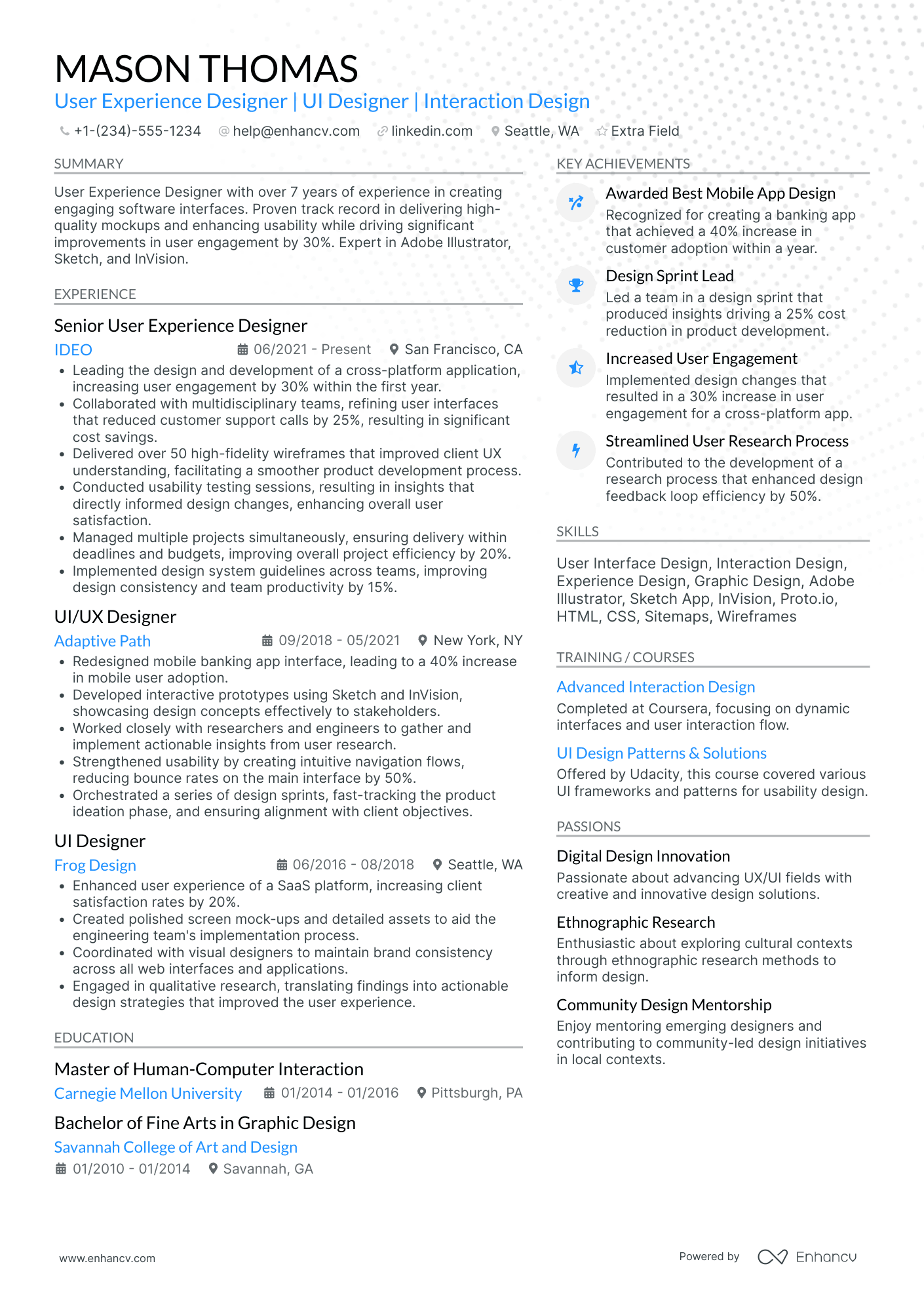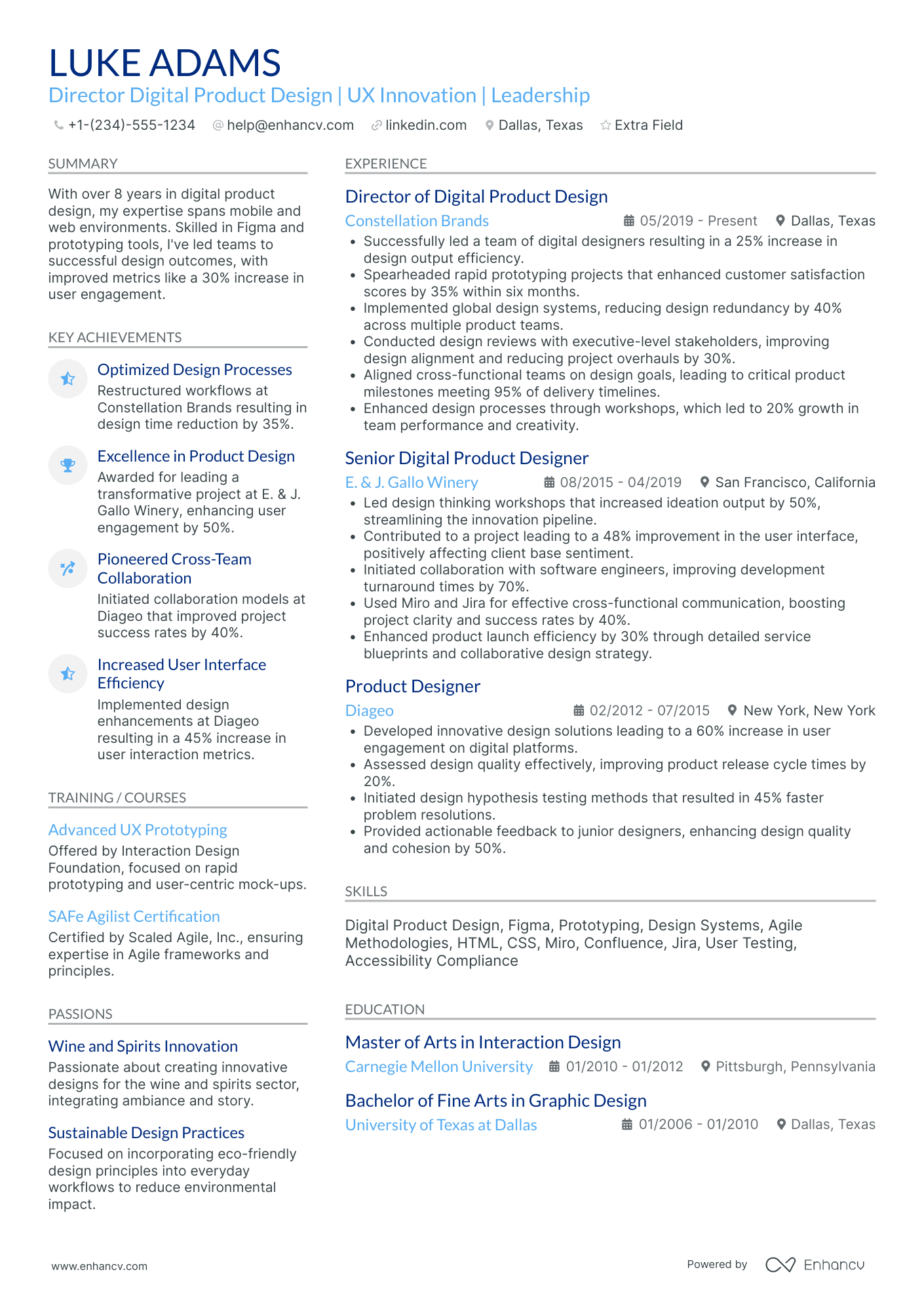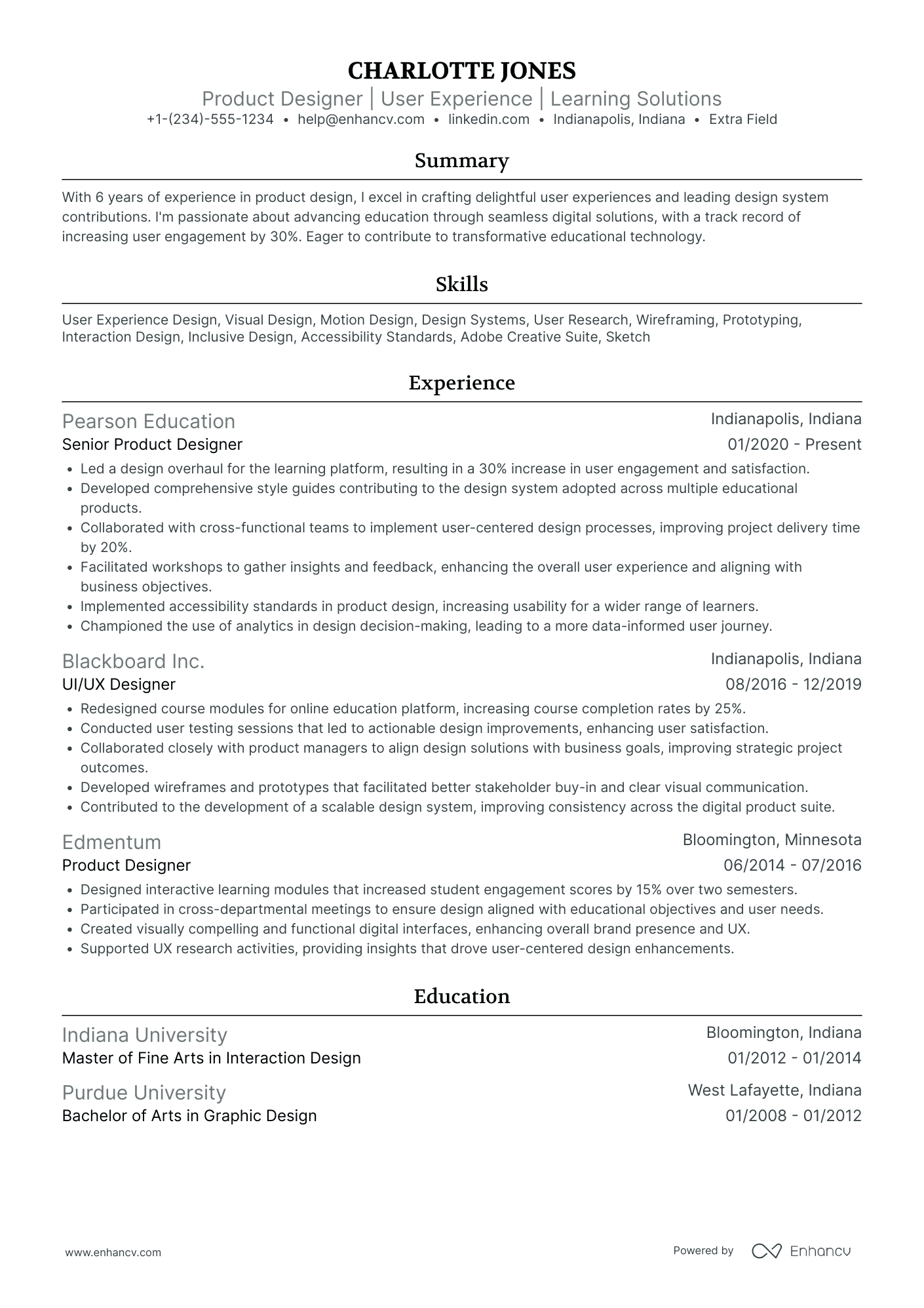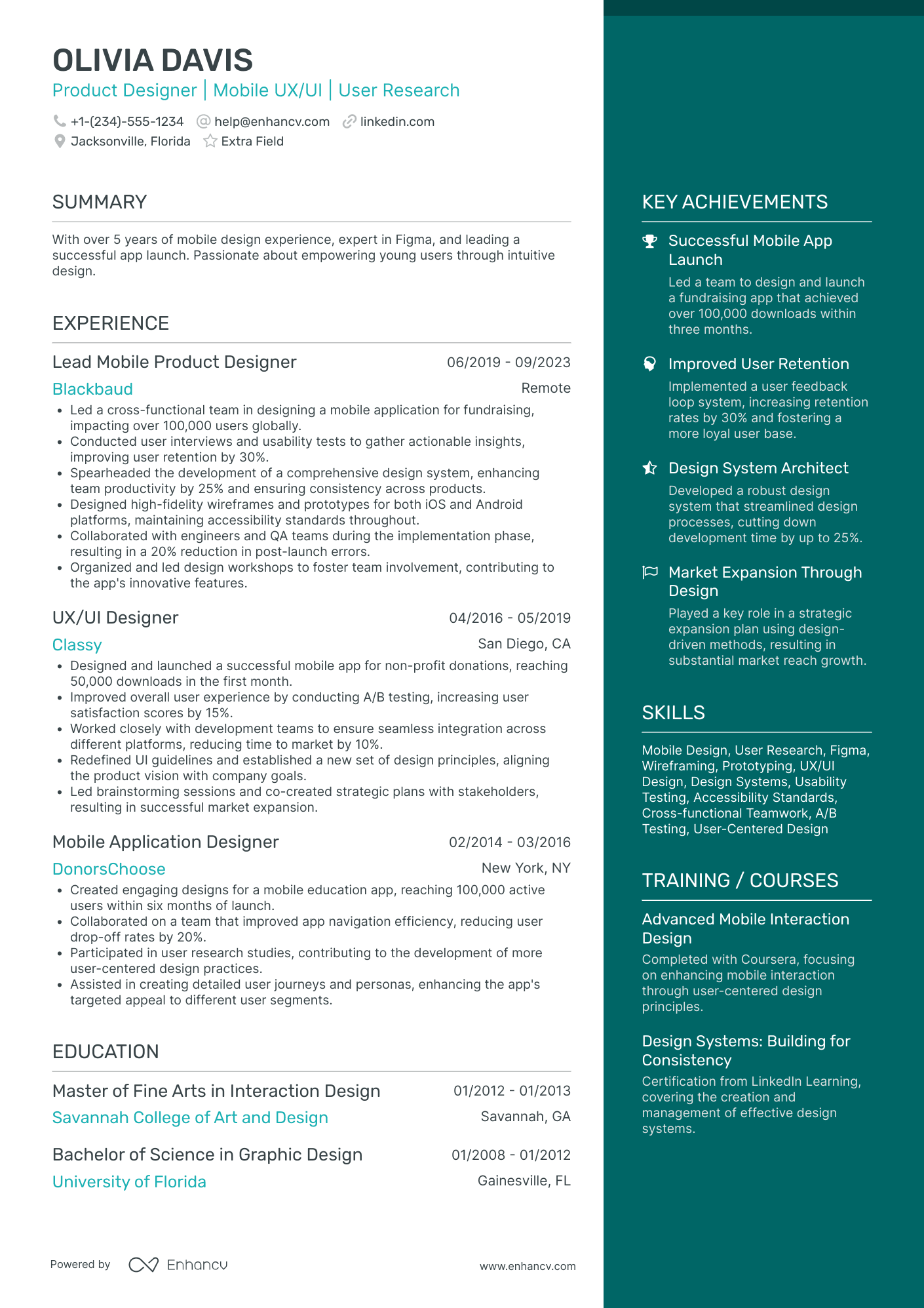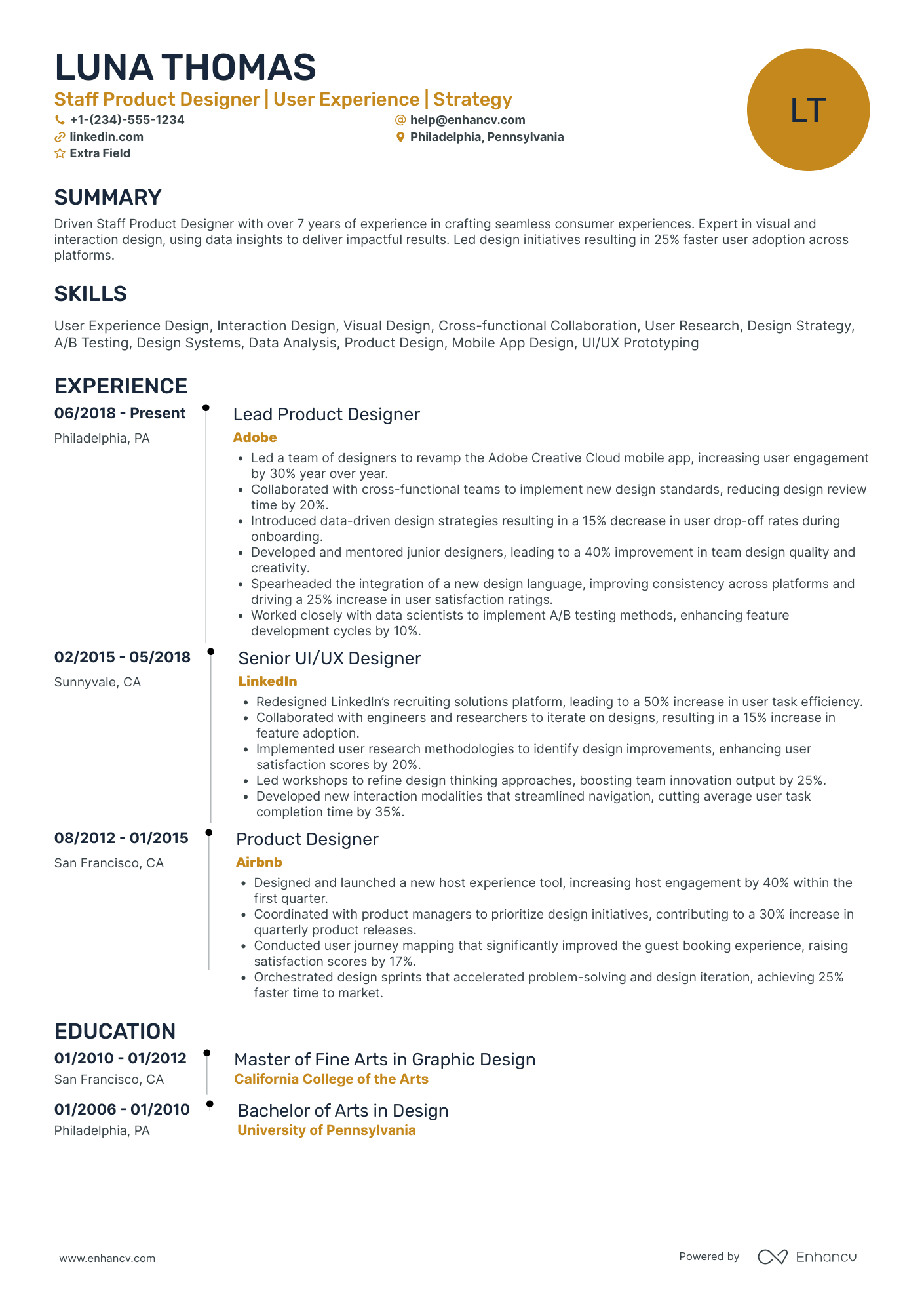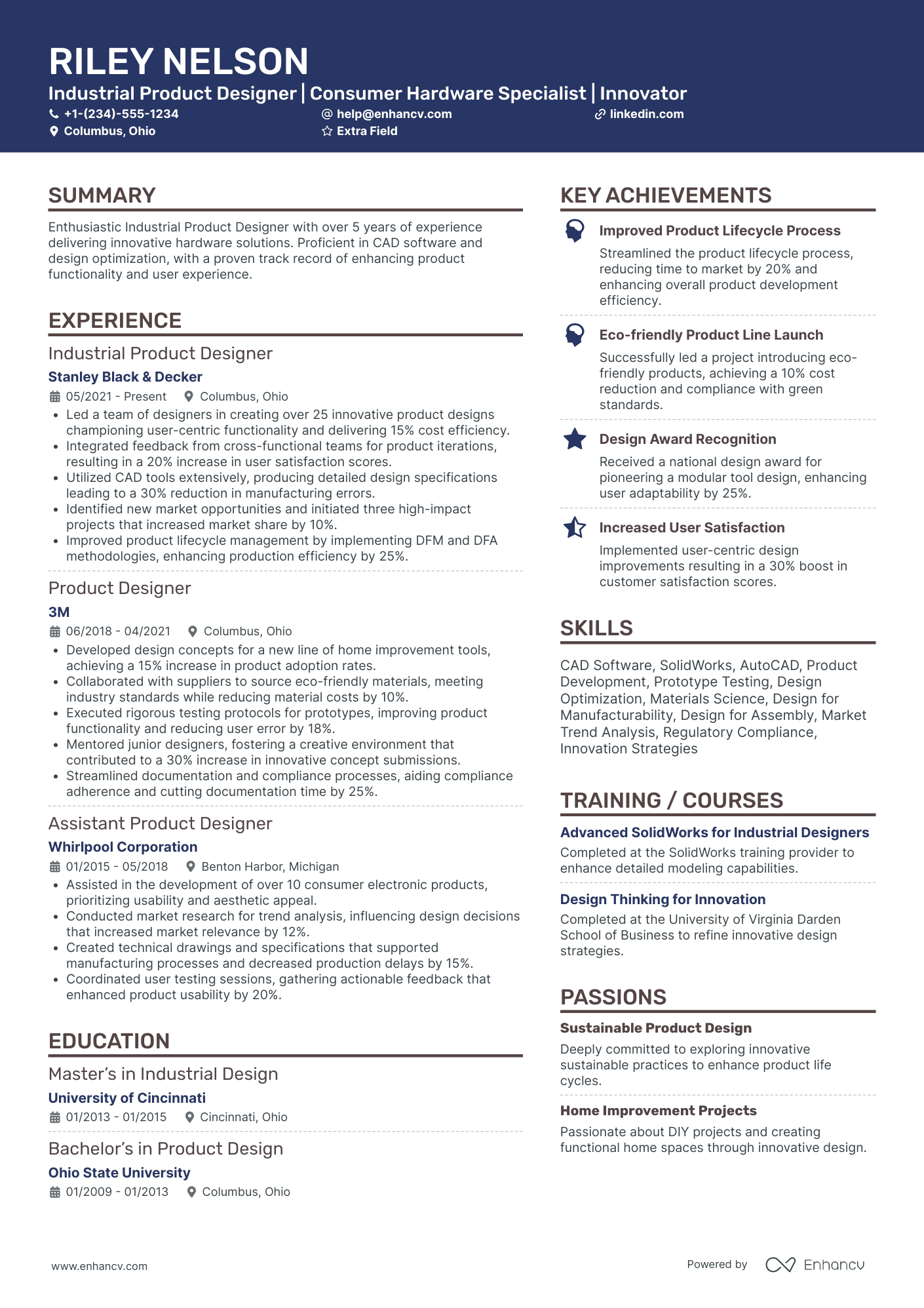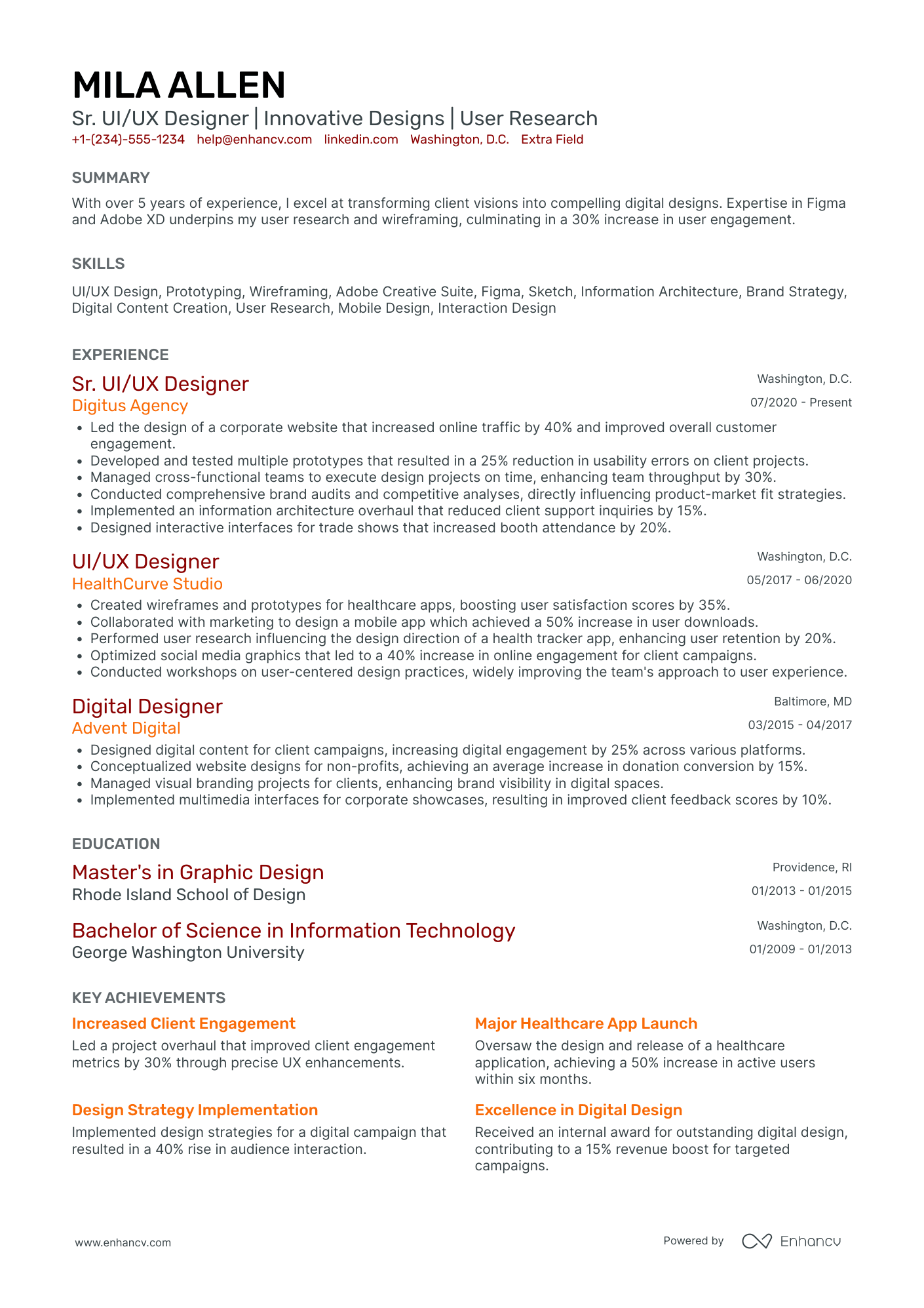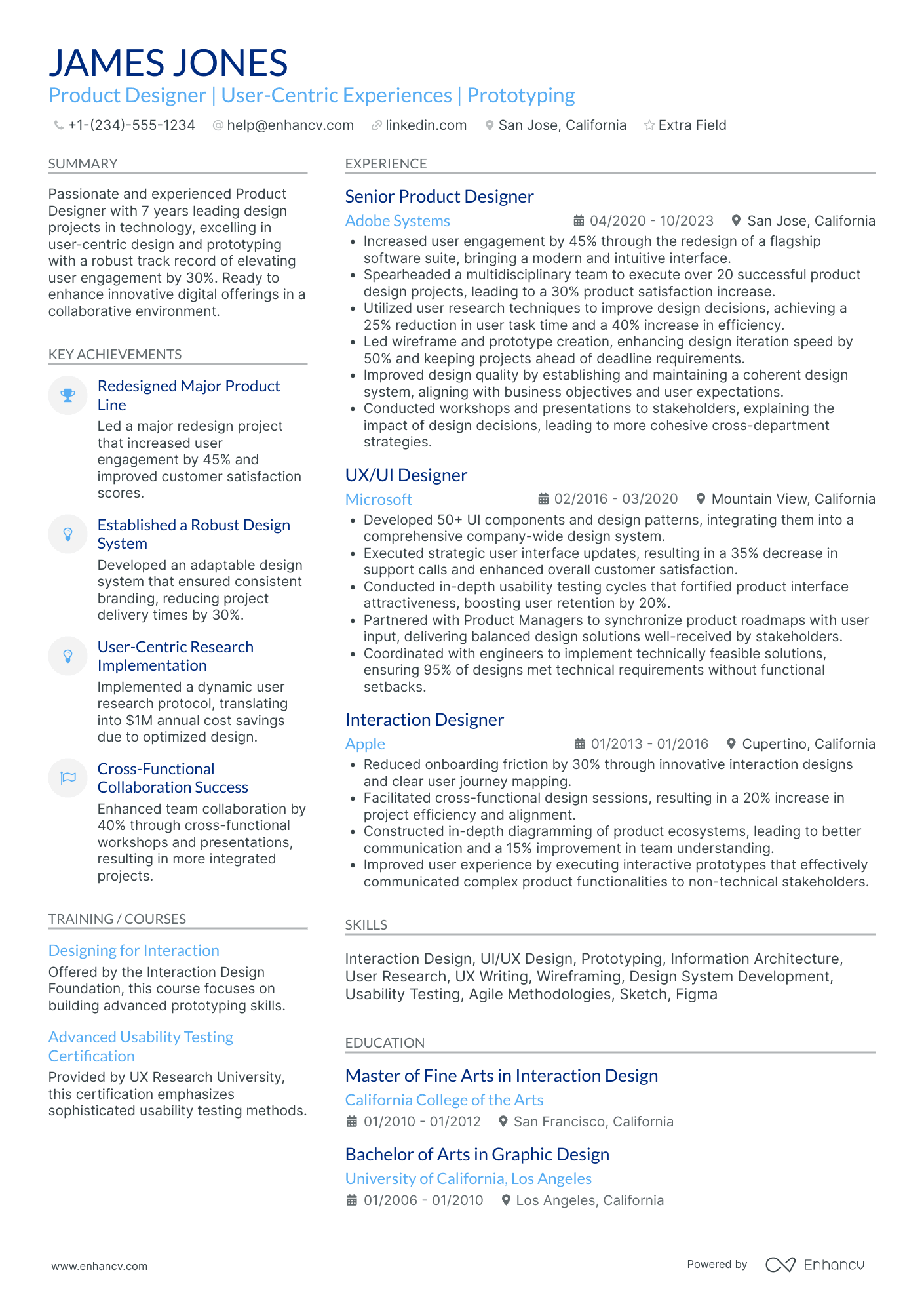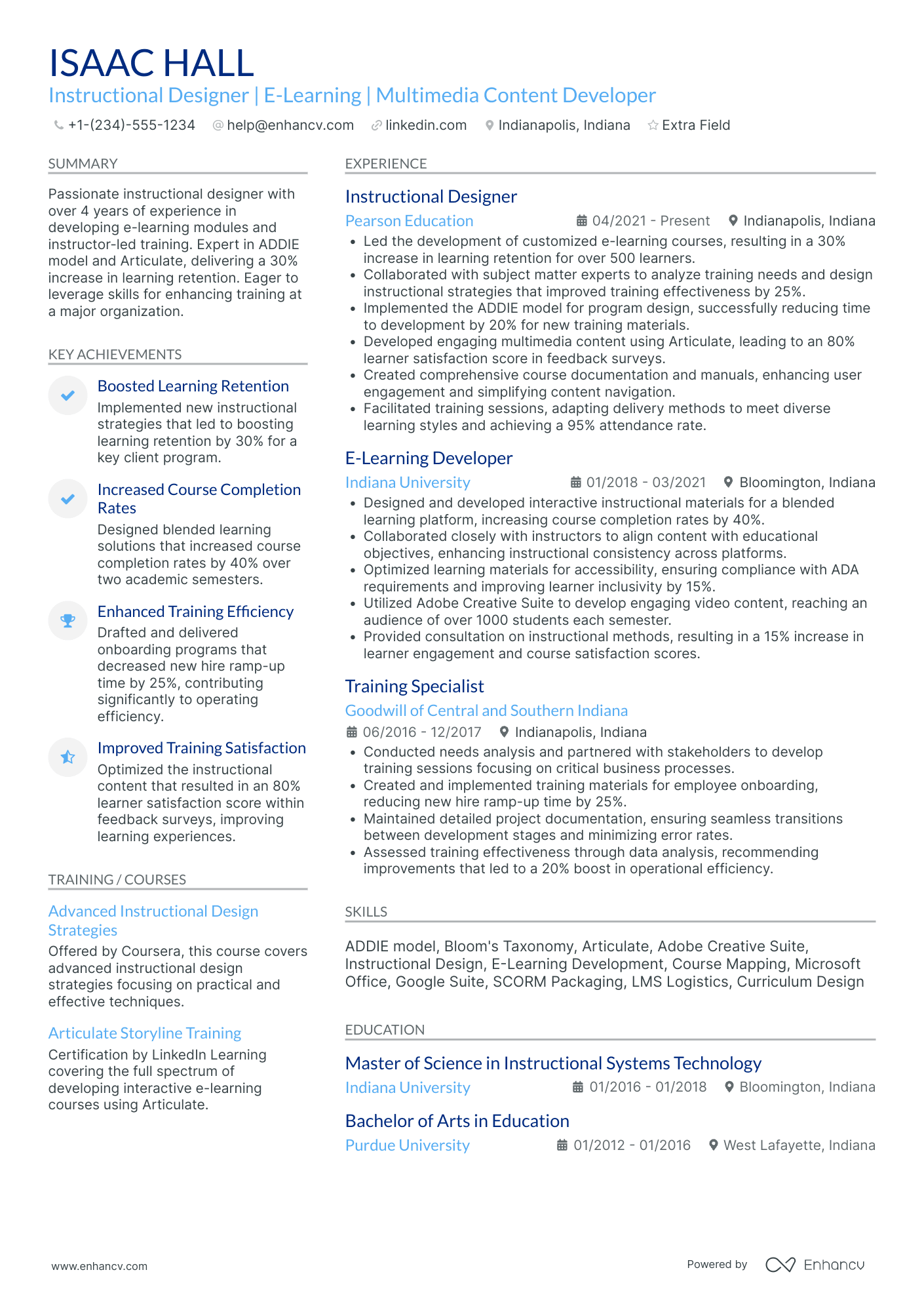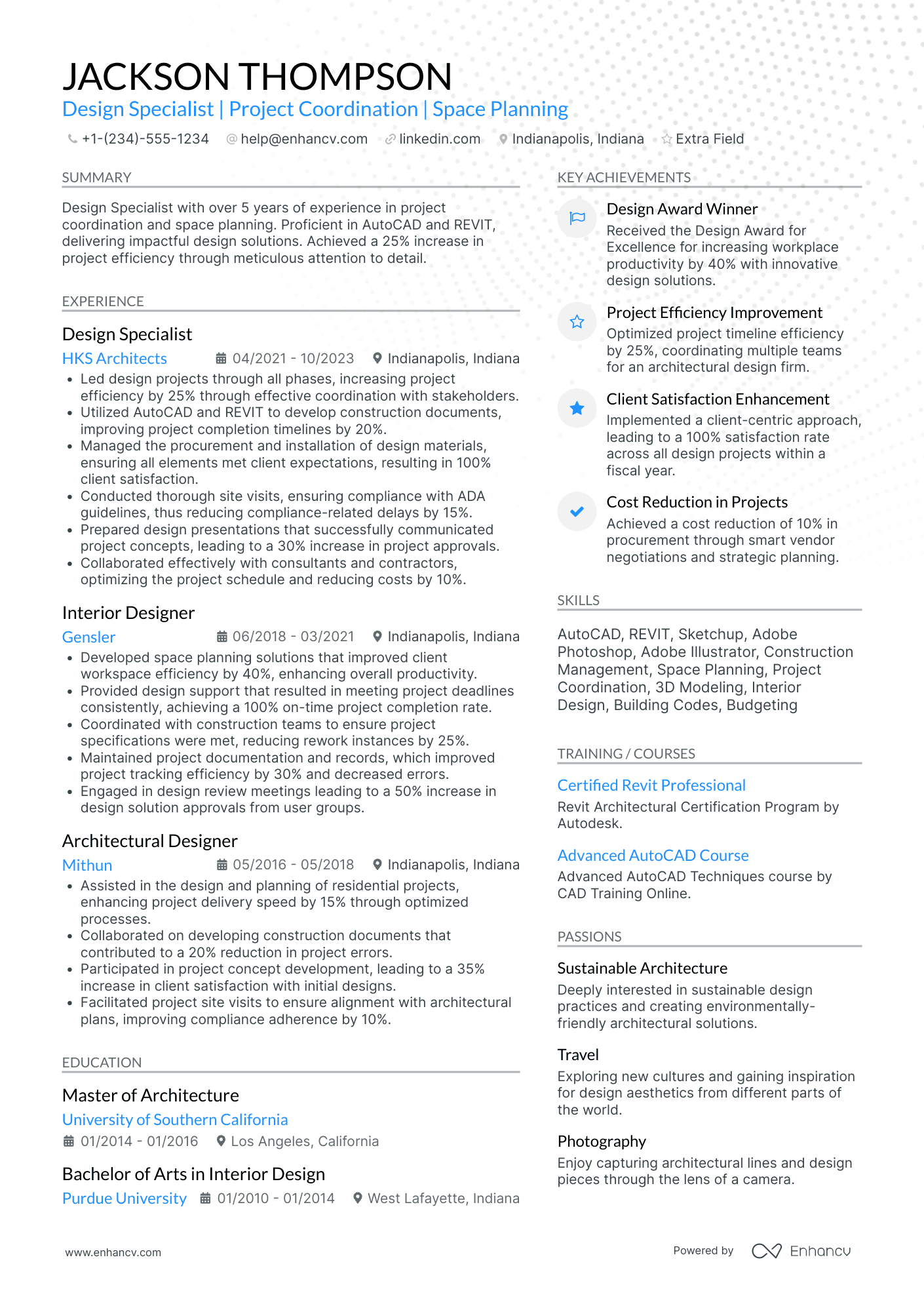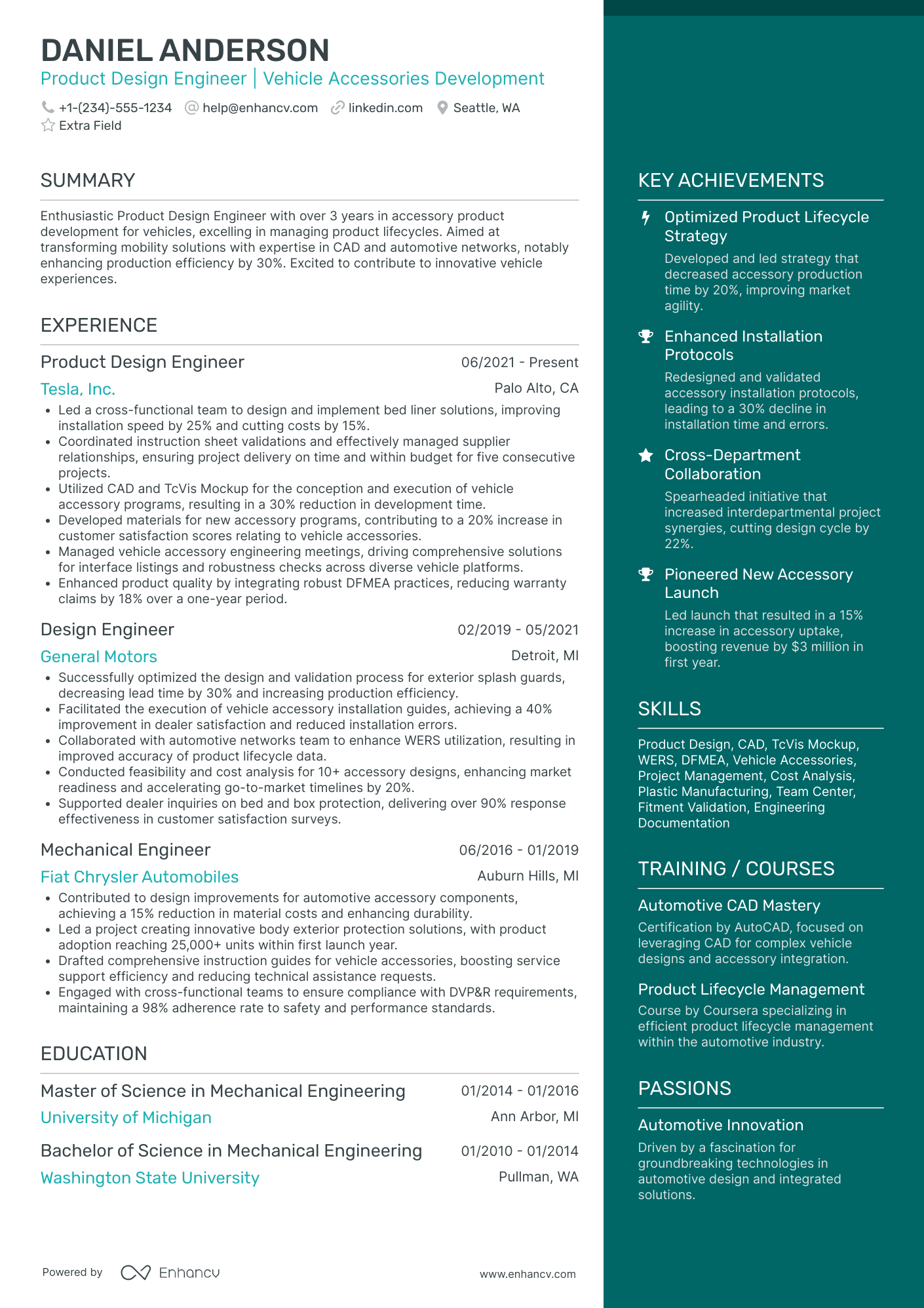As a product designer, you may struggle with showcasing the full range of your design projects without making your resume too dense or cluttered. Our guide will provide you with strategic tips to help you highlight your most impactful work while maintaining a clean and professional resume layout.
- Aligning the top one-third of your product designer resume with the role you're applying for.
- Curating your specific product designer experience to get the attention of recruiters.
- How to list your relevant education to impress hiring managers recruiting for the product designer role.
Discover more product designer professional examples to help you write a job-winning resume.
- Video Production Manager Resume Example
- Digital Designer Resume Example
- Art Director Resume Example
- Brand Designer Resume Example
- Sound Designer Resume Example
- Magazine Designer Resume Example
- Set Designer Resume Example
- Game Designer Resume Example
- Logo Designer Resume Example
- Mechanical Designer Resume Example
Enhancing your product designer resume: format and layout tips
"Less is more" - this principle is key for your product designer resume design. It emphasizes the importance of focusing on why you're the ideal candidate. Simultaneously, it's crucial to select a resume design that is both clear and simple, ensuring your qualifications are easily readable.
Four popular formatting rules (and an additional tip) are here to optimize your product designer resume:
- Listing experience in reverse chronological order - start with your most recent job experiences. This layout helps recruiters see your career progression and emphasizes your most relevant roles.
- Including contact details in the header - make sure your contact information is easily accessible at the top of your resume. In the header, you might also include a professional photo.
- Aligning your expertise with the job requirements - this involves adding essential sections such as experience, skills, and education that match the job you're applying for.
- Curating your expertise on a single page - if your experience spans over a decade, a two-page resume is also acceptable.
Bonus tip: Ensure your product designer resume is in PDF format when submitting. This format maintains the integrity of images, icons, and layout, making your resume easier to share.
Finally, concerning your resume format and the Applicant Tracker System (ATS):
- Use simple yet modern fonts like Rubik, Lato, Montserrat, etc.
- All serif and sans-serif fonts are friendly to ATS systems. Avoid script fonts that look like handwriting, however.
- Fonts such as Ariel and Times New Roman are suitable, though commonly used.
- Both single and double-column resumes can perform well with the ATS.
Be mindful of regional differences in resume formats – a Canadian layout, for instance, might vary.
Upload & Check Your Resume
Drop your resume here or choose a file. PDF & DOCX only. Max 2MB file size.
PRO TIP
If you failed to obtain one of the certificates, as listed in the requirements, but decide to include it on your resume, make sure to include a note somewhere that you have the "relevant training, but are planning to re-take the exams". Support this statement with the actual date you're planning to be re-examined. Always be honest on your resume.
The five (plus) definite sections your resume for a product designer job should include are:
- Header with your headline, contact details, and/or a preview of your work
- Summary (or objective) to pinpoint how your success aligns with the role
- Experience with bullets of your most relevant achievements in the field
- Skills to integrate vital job requirements (both technical and personal)
- Your further dedication to the field, showcased via relevant higher education and/or certifications
What recruiters want to see on your resume:
- Demonstrated design skills with a strong portfolio showcasing innovative design solutions and a user-centered design approach.
- Proficiency with design and prototyping tools such as Sketch, Adobe Creative Suite, Figma, and InVision.
- Experience with conducting user research, usability testing, and the ability to translate insights into design improvements.
- Understanding of design principles, interaction design, and information architecture as related to product development.
- Effective communication and collaboration skills, evidenced by the ability to work with cross-functional teams and articulate design decisions.
Guide to your most impressive product designer resume experience section
When it comes to your resume experience , stick to these simple, yet effective five steps:
- Show how your experience is relevant by including your responsibility, skill used, and outcome/-s;
- Use individual bullets to answer how your experience aligns with the job requirements;
- Think of a way to demonstrate the tangible results of your success with stats, numbers, and/or percentages ;
- Always tailor the experience section to the product designer role you're applying for - this may sometimes include taking out irrelevant experience items;
- Highlight your best (and most relevant) achievements towards the top of each experience bullet.
You're not alone if you're struggling with curating your experience section. That's why we've prepared some professional, real-life product designer resume samples to show how to best write your experience section (and more).
- Spearheaded the product design revamp for a flagship software suite at Apple, enhancing user engagement by 30%.
- Implemented user-centered design methodologies to create intuitive user interfaces, reducing customer support inquiries by 25%.
- Collaborated with cross-functional teams to integrate market research into design decisions, directly impacting product usability and customer satisfaction.
- Led a team of product designers at Google, delivering innovative user experience strategies for next-generation AI platforms.
- Championed a design-thinking culture, organizing workshops that improved team collaboration and creative output by 40%.
- Orchestrated the user testing process for new product features, accelerating the iteration cycle and improving user retention rates.
- Pioneered an immersive VR-based design environment at Facebook, increasing the prototype development speed by 50%.
- Conducted extensive user research to inform design solutions that led to a 20% uplift in daily active users.
- Mentored junior designers, enhancing team productivity and reducing onboarding time by two weeks.
- Played a pivotal role in the user interface redesign of Tesla's in-car entertainment system, which boosted customer satisfaction scores by 15%.
- Applied sustainable design principles in developing new product packaging, cutting down material costs by 10% without sacrificing design quality.
- Engaged in frequent A/B testing, refining product designs that heightened conversion rates by 22%.
- Designed a scalable design system at Microsoft, ensuring brand consistency across hundreds of products and services.
- Enhanced cross-device user experience, leading to an increased average session length across mobile and desktop versions by 18 minutes.
- Optimized the design process by implementing agile methodologies, shortening the design phase timeline by 30%.
- Innovated user flow processes at Spotify, enabling users to discover new music 25% more efficiently than before.
- Integrated data analytics into the design lifecycle, identifying key user trends that shaped feature enhancements.
- Fostered a collaborative design environment, reducing time taken from conceptualization to prototype by three weeks.
- Directed the visual and interaction design for Amazon's shopping app, resulting in a 40% increase in repeat customer transactions.
- Coordinated with engineers to integrate voice recognition features, offering users an innovative shopping experience.
- Designed and executed high-fidelity mockups and interactive prototypes, presenting to stakeholders and receiving a 95% approval rating.
- Curated user-centric design solutions at Netflix, elevating content discoverability and contributing to a 10% reduction in churn rate.
- Harnessed the power of predictive analytics to drive design decisions, significantly improving personalized user recommendations.
- Improved the design sprint process, leading to a 50% increase in rapid prototyping and testing efficiency.
- Developed a pioneering mobile-first design approach at Samsung, increasing mobile app engagement by 35%.
- Leveraged user feedback to iterate product designs, facilitating a 20% improvement in user ratings for interface usability.
- Conducted heuristic evaluations and competitive analysis to inform design strategies, leading to a robust product roadmap.
- Executed strategic rebranding initiatives at Adobe, harmonizing the interface design across multiple software, which was well-received by users.
- Utilized advanced prototyping tools to visualize new concepts, enabling the rapid validation of ideas and saving approximately 20% in development costs.
- Facilitated interactive user sessions that provided actionable insights, guiding the evolution of product features and services.
The following content includes information from "O*NET OnLine" by the U.S. Department of Labor, Employment and Training Administration (USDOL/ETA). Used under the CC BY 4.0 license. The data represents the top responsibilities present on the task lists for product designer professionals.
Top Responsibilities for Product Designer:
- Develop detailed design drawings and specifications for mechanical equipment, dies, tools, and controls, using computer-assisted drafting (CAD) equipment.
- Produce three-dimensional models, using computer-aided design (CAD) software.
- Lay out and draw schematic, orthographic, or angle views to depict functional relationships of components, assemblies, systems, and machines.
- Modify and revise designs to correct operating deficiencies or to reduce production problems.
- Review and analyze specifications, sketches, drawings, ideas, and related data to assess factors affecting component designs and the procedures and instructions to be followed.
- Check dimensions of materials to be used and assign numbers to the materials.
- Design scale or full-size blueprints of specialty items, such as furniture and automobile body or chassis components.
- Compute mathematical formulas to develop and design detailed specifications for components or machinery, using computer-assisted equipment.
- Coordinate with and consult other workers to design, lay out, or detail components and systems and to resolve design or other problems.
- Confer with customer representatives to review schematics and answer questions pertaining to installation of systems.
Quantifying impact on your resume
- Highlight the percentage increase in user engagement due to a redesign you led or contributed to, showing your ability to drive user interaction.
- Quantify the reduction in production costs as a result of material or process changes you implemented, demonstrating cost-efficiency.
- Include the number of design iterations you managed for a particular product, emphasizing your project management skills.
- Detail the number of products you've brought to market, indicating experience with the product lifecycle and launch strategies.
- Specify the growth in sales or market share after the release of a product you designed, showing your impact on business performance.
- Measure the improvement in product ratings or customer satisfaction scores due to your design solutions, showcasing user-centric design expertise.
- Document the size of the cross-functional teams you have worked with, highlighting your collaboration and communication skills.
- Cite the amount of time saved in design processes through the introduction of new tools or methods you championed, showing optimization abilities.
Action verbs for your product designer resume
No experience, no problem: writing your product designer resume
You're quite set on the product designer role of your dreams and think your application may add further value to your potential employers. Yet, you have no work experience . Here's how you can curate your resume to substitute your lack of experience:
- Don't list every single role you've had so far, but focus on ones that would align with the job you're applying for
- Include any valid experience in the field - whether it's at research or intern level
- Highlight the soft skills you'd bring about - those personality traits that have an added value to your application
- Focus on your education and certifications, if they make sense for the role.
Recommended reads:
PRO TIP
List all your relevant higher education degrees within your resume in reverse chronological order (starting with the latest). There are cases when your PhD in a particular field could help you stand apart from other candidates.
In-demand hard skills and soft skills for your product designer resume
A vital element for any product designer resume is the presentation of your skill set.
Recruiters always take the time to assess your:
- Technological proficiency or hard skills - which software and technologies can you use and at what level?
- People/personal or soft skills - how apt are you at communicating your ideas across effectively? Are you resilient to change?
The ideal candidate presents the perfect balance of hard skills and soft skills all through the resume, but more particular within a dedicated skills section.
Building your product designer skills section, you should:
- List up to six skills that answer the requirements and are unique to your expertise.
- Include a soft skill (or two) that defines you as a person and professional - perhaps looking back on feedback you've received from previous managers, etc.
- Create up to two skills sections that are organized based on the types of skills you list (e.g. "technical skills", "soft skills", "product designer skills", etc.).
- If you happen to have technical certifications that are vital to the industry and really impressive, include their names within your skills section.
At times, it really is frustrating to think back on all the skills you possess and discover the best way to communicate them across.
We understand this challenge - that's why we've prepared two lists (of hard skills and soft skills) to help you build your next resume, quicker and more efficiently:
Top skills for your product designer resume:
Sketch
Adobe XD
Figma
InVision
HTML/CSS
JavaScript
Prototyping
User Interface Design
User Experience Research
Responsive Design
Communication
Collaboration
Problem Solving
Creativity
Attention to Detail
Time Management
Adaptability
Critical Thinking
Empathy
Project Management
Next, you will find information on the top technologies for product designer professonals from "O*NET OnLine" by the U.S. Department of Labor, Employment and Training Administration (USDOL/ETA). Used under the CC BY 4.0 license.
Top technologies for Product Designer’s resume:
- Autodesk AutoCAD Civil 3D
- Autodesk Revit
- Microsoft PowerPoint
- Adobe After Effects
- Trimble SketchUp Pro
PRO TIP
If you happen to have some basic certificates, don't invest too much of your product designer resume real estate in them. Instead, list them within the skills section or as part of your relevant experience. This way you'd ensure you meet all job requirements while dedicating your certificates to only the most in-demand certification across the industry.
Listing your education and certifications on your product designer resume
Don't underestimate the importance of your resume education section . As it may hint at various skills (and experience) that are relevant to the job. When writing your education section:
- Include only higher education degrees with information about the institution and start/end dates
- If you're in the process of obtaining your degree, include your expected graduation date
- Consider leaving off degrees that aren't relevant to the job or industry
- Write a description of your education if it presents you with an opportunity to further showcase your achievements in a more research-focused environment
When describing your certifications on your resume, always consider their relevancy to the role. Use the same format to describe them as you would for your education. If you're wondering what the best certificates out there are for product designer roles, check out the list below.
The top 5 certifications for your product designer resume:
- Certified Professional in Accessibility Core Competencies (CPACC) - International Association of Accessibility Professionals (IAAP)
- User Experience (UX) Design Certificate - Nielsen Norman Group (NN/g)
- Adobe Certified Expert (ACE) - Adobe
- Certified Usability Analyst (CUA) – Human Factors International (HFI)
- Interaction Design Foundation (IDF) Certificate - Interaction Design Foundation
The content below includes information from "O*NET OnLine" by the U.S. Department of Labor, Employment and Training Administration (USDOL/ETA). Used under the CC BY 4.0 license. The data represents the top associations for product designer professionals.
Top US associations for a Product Designer professional
- Accrediting Commission of Career Schools and Colleges
- American Design Drafting Association
- Society of Manufacturing Engineers
PRO TIP
If you're in the process of obtaining your certificate or degree, list the expected date you're supposed to graduate or be certified.
Recommended reads:
Best practices to your product designer resume summary or objective
To start, how do you know if you should include a resume summary or a resume objective ?
- Resume summaries are ideal for product designer professionals with more experience, who'd like to give a quick glimpse of their biggest career achievements in the top one-third of their resumes.
- On the other hand, resume objectives serve as a road map for recruiters. Candidates use the objective to show how their experience aligns with the product designer role they're applying for while showcasing the North Star of their career (or where they want to be as a professional in the next couple of years).
The resume summary or resume objective could be the perfect fit for your product designer resume. The function of both is to highlight your professionalism succinctly. So, keep your writing specific: include no more than four sentences and target your application to the role. Here's how these specific resume sections help the product designer candidates stand out.
Resume summaries for a product designer job
- Seasoned product designer with 8 years of experience at a tech-focused lifestyle company, adept in UX/UI principles and prototyping. Lauded for reimagining mobile app experiences leading to a 30% increase in user engagement. Expertise in Adobe Creative Suite and user-centered design methodologies.
- With a decade-long career in graphic design and brand development, I have pivoted to product design, leveraging my expertise in visual communication and problem-solving. Skilled in Adobe XD and Sketch, my redesign of an ecommerce platform boosted conversion rates by 25% within a year.
- Former Mechanical Engineer turning towards Product Design, bringing a unique perspective grounded in functionality and user experience. Proficient in CAD tools and rapid prototyping with a track record of developing patented industrial products, aiming to enhance user interaction in digital environments.
- Accomplished product designer with over 6 years of success in creating intuitive and stunning designs for SaaS applications. Mastery in utilizing design tools such as Figma and InVision, with recognition for designing an award-winning interface featured in 'Design Innovators' magazine.
- Seeking to apply a fresh and imaginative approach to product design, my zeal for creating impactful user experiences is matched with a robust understanding of design fundamentals acquired through rigorous self-study and project-based learning, including extensive practice in Sketch and Principle.
- Eager to embark on a career in Product Design, I am equipped with a comprehensive foundation from a specialized design bootcamp and hands-on experience through freelance projects. Ready to apply my skills in user research, wireframing, and Adobe Creative Cloud to create meaningful product solutions.
Optimize your resume summary and objective for ATS
Drop your resume here or choose a file.
PDF & DOCX only. Max 2MB file size.
Average salary info by state in the US for product designer professionals
Local salary info for Product Designer.” Source: My Next Move, National Center for O*NET Development. Accessed 10/15/2024
| State | Average Salary (in USD) |
|---|---|
| US National Average | $64,060 |
| California (CA) | $78,610 |
| Texas (TX) | $68,070 |
| Florida (FL) | $51,800 |
| New York (NY) | $69,990 |
| Pennsylvania (PA) | $60,460 |
| Illinois (IL) | $67,920 |
| Ohio (OH) | $63,320 |
| Georgia (GA) | $61,680 |
| North Carolina (NC) | $60,400 |
| Michigan (MI) | $63,570 |
More sections to ensure your product designer resume stands out
If you're looking for additional ways to ensure your product designer application gets noticed, then invest in supplementing your resume with extra sections, like:
These supplementary resume sections show your technical aptitude (with particular technologies and software) and your people skills (gained even outside of work).
Key takeaways
At the end of our guide, we'd like to remind you to:
- Invest in a simple, modern resume design that is ATS friendly and keeps your experience organized and legible;
- Avoid just listing your responsibilities in your experience section, but rather focus on quantifiable achievements;
- Always select resume sections that are relevant to the role and can answer job requirements. Sometimes your volunteering experience could bring more value than irrelevant work experience;
- Balance your technical background with your personality traits across various sections of your resume to hint at how much time employers would have to invest in training you and if your profile would be a good cultural fit to the organization;
- Include your academic background (in the form of your relevant higher education degrees and certifications) to show recruiters that you have the technical basics of the industry covered.
Product Designer resume examples
By Experience
Senior Product Designer
Junior Product Designer
Lead Product Designer
Product Design Intern
By Role
